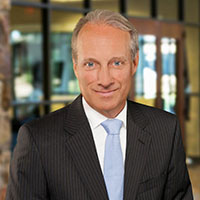Christians who read the same Bible often hold drastically different political positions—and that’s not necessarily a bad thing, according to two experts in church-state relations.
Melissa Rogers of the Brookings Institution, former general counsel for the Baptist Joint Committee for Religious Liberty, and Kelly Shackelford, president and CEO of the First Liberty Institute, participated in an online panel discussion on the subject “Render Unto Caesar: How should faith inform politics?”
Malcolm Foley, special adviser to the president for equity and campus engagement at Baylor University, moderated the discussion. Baylor in Washington sponsored the webinar in partnership with Baylor’s Institute for Faith and Learning, Faith Angle Forum and Washington College’s Institute for Religion, Politics and Culture.
Diverse views a ‘source of great richness’
“Sometimes we will find somewhat different ways from our Bibles to the ballot box,” said Rogers, who was director of the White House Office of Faith-based and Neighborhood Initiatives during the Obama administration.

She called politically diverse opinions among Christians “a source of great richness.” It offers fellow believers opportunities to learn from each other and “test our ideas”—provided Christians are willing to exercise humility, she noted.
Rogers quoted the late Barbara Jordan, member of the U.S. House of Representatives from Texas, who said, “You would do well to pursue your causes with vigor, while remembering that you are a servant of God, not a spokesperson for God … and remembering that God might well choose to bless an opposing point of view for reasons that have not been revealed to you.”
Shackelford noted he and Rogers sometimes have filed briefs before the U.S. Supreme Court arguing opposing positions on certain church-state issues, but they share a common goal.
“We want there to be the most religious freedom possible for people in this country. We just think we get there in different ways,” he said.
Christians may come to varied political views based on different beliefs about the nature of Scripture and how they apply the Bible, he added.
When it comes to choosing elected officials, Shackelford said, two issues factor into decision-making—selecting someone who can bring about desired policy results and evaluating a candidate’s character.
Christian citizenship a stewardship issue
Jesus was political in the sense that he stood for justice, seeking to release people from bondage, Rogers said.
“Jesus was a proponent of justice, in my view,” she said.

Because American Christians live in a constitutional republic governed according to democratic principles, they have a stewardship responsibility to be involved in politics, Shackelford asserted.
Christians have a calling “to represent Christ in every area of society, and that includes in the voting booth … representing biblical values that bless everyone.” he said.
God created three human institutions—the family, the church and government, he explained. If Christians are not involved in politics and government, others who do not hold to biblical values will fill that space, Shackelford said.
“Christians should be involved in politics and bring their values and their biblical understanding to make a difference in government and, therefore, in other people’s lives,” he said.
Influence happens within political parties
Rogers and Shackelford agreed the most effective way Christians can influence public policy is by becoming involved with a political party that “approximates” their values and beliefs.

“Being involved in a party doesn’t mean you agree with everything that party says or all that the party’s leadership is embracing at a particular point in time, but it means you are going to situate yourself in a particular conversation and try to influence that conversation,” Rogers said.
Affiliation with a political party does not mean blind allegiance to it, she stressed. For instance, Christians within a political party may choose to vote for a candidate from another party in a particular election cycle based on issues of character or record in office, she added.
“Certainly, there is a long and rich history of people challenging their party from within, and I think that’s a healthy thing,” she said.
Any association—whether in a church or a political party—is not built upon total agreement on all matters, but rather on the desire to associate based on those important principles individuals hold in common, Shackelford said.
What are ‘deal-breakers’ for Christians?
When asked about “deal-breakers” that would prevent a Christian from affiliating with a particular candidate or party, Rogers mentioned “dehumanization of people,” “inciting violence” and “supporting racism” as actions that would fit that category for her.
On some polarizing issues, such as abortion, she suggested looking for areas of common ground and shared goals.
“To me, the important question is, ‘What are we doing to reduce the number of abortions?’” she said.
Shackelford, on the other hand, said some issues constitute such a “grave evil” that Christians cannot in good conscience associate with a political party that supports them. For a significant number of American Christians, abortion fits into that category, he said.
“There are issues like that,” he said. “I don’t think there are that many.”
Church as the ‘conscience of the state’
The institutional separation of church and state is “a biblical concept when you apply it correctly,” Shackelford asserted. However, he insisted, it does not require the separation of religious values from government, nor does it require the erasure of biblical symbols from public areas.
Rogers agreed religious people have every right to bring their values into the public square and engage government. Institutional separation of church and state means churches and government have “meaningful independence” from each other, and the church has freedom to act as the “conscience of the state,” she added.
However, she expressed concern about giving government a “blank check” to misuse religious symbols to advance its own agenda.
“We need to be careful about governmental appropriation of religious symbols and religious messages,” she said.
Stand up for religious minorities
Rogers and Shackelford found common ground in affirming the rights of religious minorities—particularly globally, where the free exercise of religion can be a matter of life or death, as in the case of Uighur Muslims in China.
“We should care because we want to protect the God-given religious liberty rights of everyone, and we want everyone to be free from such horrific governmental coercion,” Rogers said.
Concern for minority religions must extend to groups within the United States, she added.
“As Baptists, we were a despised minority in many places during the founding era of this country, and we should never forget that,” she said.
Shackelford likewise emphasized the importance of standing for the freedom of American religious minorities.
“If you are not willing to stand with the smallest minorities, then that’s where the freedom will be taken away. And once that precedent is set, it will be applied to you in the future,” he said.
Civility essential
The two panelists also agreed on the importance of civil discourse and the free exchange of ideas.
“We won’t agree on everything. That is completely clear. But we don’t have to be as divided as we are,” Rogers said.
In light of the increasing polarization in the United States, Rogers encouraged Christians to be intentional about engaging with people who represent different ethnic and racial groups to gain new perspectives—“to break out of our bubbles.”
“Increasingly, we have people living with, working with and maybe even worshipping only with people who see the world the same way they do,” she said.
The United States “suffers greatly” when citizens cannot engage in the marketplace of ideas in civil ways, Shackelford said.
“We will lose the country if we lose civility with one another,” he said.















We seek to connect God’s story and God’s people around the world. To learn more about God’s story, click here.
Send comments and feedback to Eric Black, our editor. For comments to be published, please specify “letter to the editor.” Maximum length for publication is 300 words.